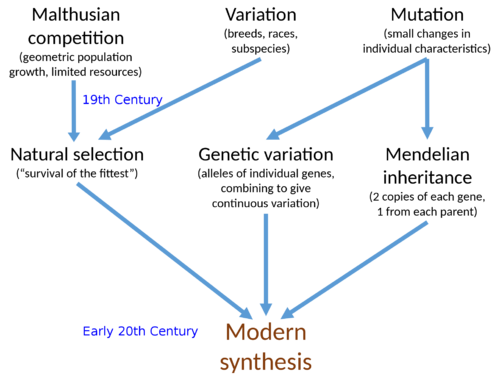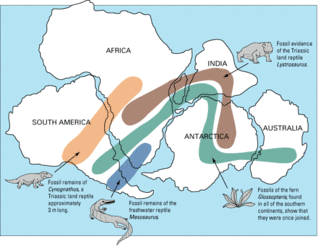Darwinism
The Meaning of "Darwinism"
as used by biologists
Biologists often use the term Darwinism (or Darwinian evolution) to refer to the theory of evolution as propounded by Darwin before the "Modern Synthesis" (see below) — that is, gradual variation in species caused by natural selection of the progeny of the fittest individuals. Nature selected for fitness to survive and have offspring, just as farmers and animal breeders selected for desirable characteristics. Natural selection was thought of as being like a farmer's selection. Thus for a modern biologist "Darwinism" refers to a concept of evolution that does not take full account of genetics.
as used by creationists
Old Earth and Evolutionary Creationists usually use the term "Darwinism" in the same way as biologists, or more broadly to mean simply "Evolution".
What "Darwinism" doesn't mean (or shouldn't)
Atheism
Darwinism is not atheism — neither is evolution.
Atheism is the belief that there is no God. Evolution is a theory about all the different kinds of living things, whether or not they were made by God "according to their kinds", as the Bible says.
The modern theory of evolution
Darwinism is not the modern theory of evolution.
Since Darwin's time there have been great advances in the knowledge of genetics, and its relationship to evolution, so that the modern theory of evolution is different from, and less speculative than Darwin's theory: see below.
The origin of the Universe
Darwinism has nothing to do with the origin of the Universe.
The Universe is not a species. Evolution as proposed by Charles Darwin was about how species originate — as the title of his book says: On the Origin of Species by Means of Natural Selection, or the Preservation of Favoured Races in the Struggle for Life.
This says nothing about the origin of the Universe.
The origin of Life
Darwinism has nothing to do with the origin of life.
Evolution is about speciation, not the origin of life. In fact, having traced species back through time, Darwin finished his Origin of Species with the suggestion a divine origin of all life in the grand "Entangled Bank" peroration at the very end of the book. This was made even more explicit when he added the words "by the Creator" for the second and subsequent editions:
. . . There is grandeur in this view of life, with its several powers, having been originally breathed by the Creator into a few forms or into one and that, whilst this planet has gone cycling on according to the fixed law of gravity, from so simple a beginning endless forms most beautiful and most wonderful have been, and are being, evolved.
but moderns find it easy to minimise that, for example in the entry for H. Charlton Bastian at encyclopedia.com:
. . . Bastian, like many others, felt that evolution implied and required a naturalistic origin of the first living things. His work was supported by Richard Owen and Alfred Russel Wallace. Darwin, too, took great interest in Bastian’s logic and experiments on spontaneous generation. Darwin had, after all, assiduously avoided the topic throughout most of On the Origin of Species (1859), only to put in some ambivalent-sounding language in the last few pages of the book (speaking of one or a few original living forms “into which life was first breathed”). And Darwin’s few private remarks on the subject also reveal an ambivalence over spontaneous generation up until about 1877. . . .
- The "far higher problem"
- Darwin specifically mentioned the question of the origin of life in the conclusion of his Origin of Species. In defending his theory of natural selection, he says
"It is no valid objection that science as yet throws no light on the far higher problem of the essence or origin of life."
See more detail at Biogenesis and Abiogenesis.
Since the Modern Synthesis, . . .
Advances in Evolutionary theory since Darwin's time
What Darwin Didn't Know — The Modern Synthesis
"Darwinism" and "evolution" are not the same!
In 1937, Theodosius Dobzhansky published Genetics and the Origin of Species — a milestone in the "Modern Synthesis" of evolutionary and genetic theories. See Modern Synthesis (20th Century) at Wikipedia.
This diagram from that page shows how advances in the knowledge of mutation, genetics and Mendelian inheritance have been combined with Darwin's concept of natural selection to form "the Modern Synthesis" of natural selection and genetics.

New Evidence since Darwin's time
A post at SentinelApologetics.org headed "What Darwin Didn't Know" describes these differences between Darwin's concept of evolution and the theory as developed in the 20th Century.
It also talks about examples of evidence for evolution that "was completely unavailable to Darwin" under these headings:
- Transitional Fossils (see Transitional forms in this wiki.)
- Plate Tectonics

See geological evidence in this wiki by Roger Evans, a Christadelphian geologist. Also consider this map, showing the break-up of ancient Gondwanaland, from the Wikipedia page on Continental Drift.
- "Unintelligent Design" (See Argument from poor design.)
- Natural Selection in Real Time
- Universal Genetic Code
21st Century Developments
As above, the 20th Century "Modern Synthesis" applied statistical insights to Darwinian evolution. In the 21st Century random genetic drift is seen as an additional driver of evolutionary change. Professor Emeritus Larry Moran (Biochemistry, University of Toronto) blogs here about 21st Century changes in evolutionary thought —BP
(This page was on the old TODO list: is there more to be done?)